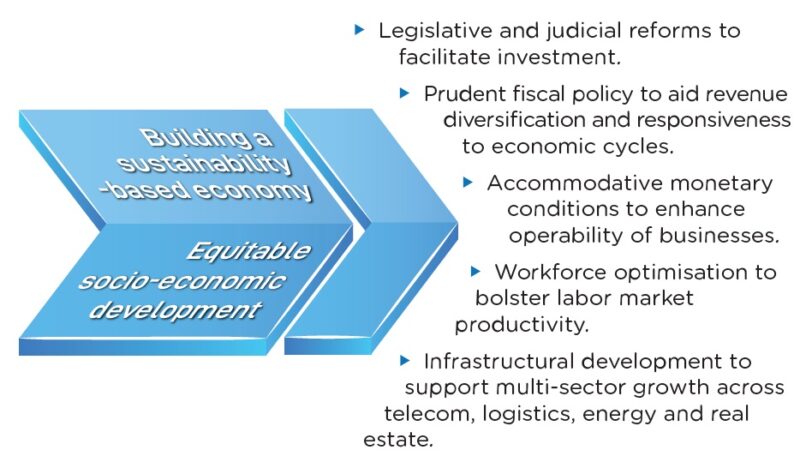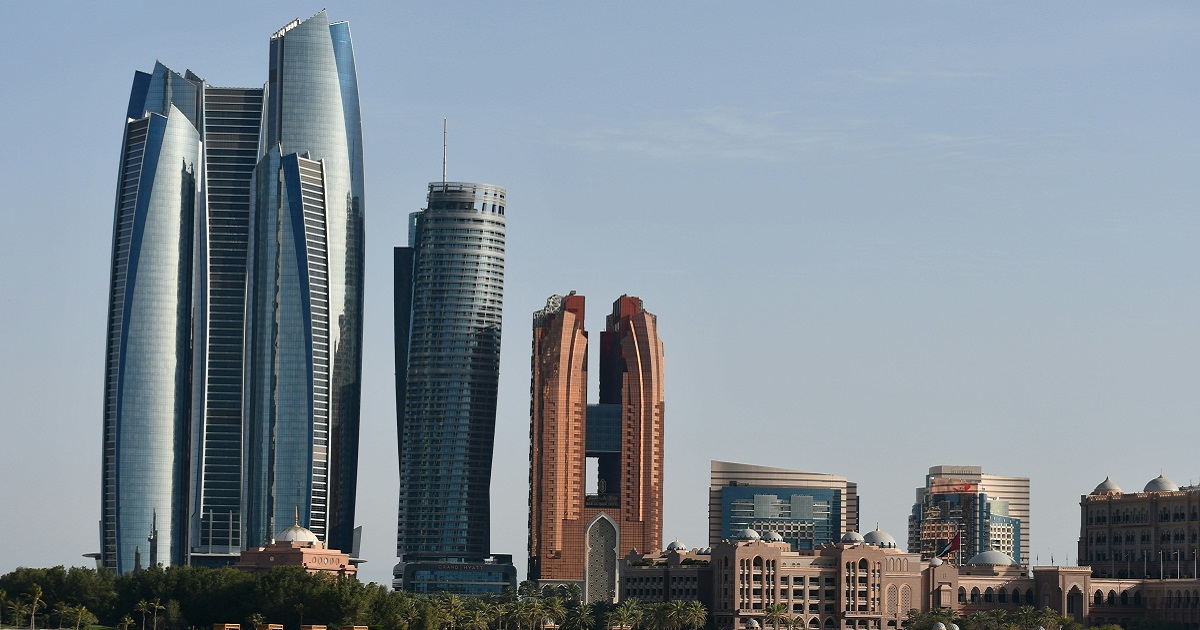Abu Dhabi: The Future of Investing
Discover the dynamic investment and economic landscape poised to redefine the future of Abu Dhabi. Analysis prepared by Krishamonish Mistry, Research Analyst – Economic Analytics at Frost & Sullivan. This article is part of In Focus special issue.
With the world progressively focusing on sustainable, multi-dimensional and inclusive economic development, Abu Dhabi – one of the fastest growing Middle East economies – will take advantage of its strategic geographical location, robust infrastructural facilities, comparatively low operating costs and favourable business environment to be at the forefront of this global transformation.
To achieve this, expanding the scope and scale of Abu Dhabi’s non-oil economy is of primary importance. The emirate’s long-term ambition is to establish itself as a knowledge-based and innovation-driven economy requiring greater policy support and business expertise.
In this regard, the emirate has initiated Abu Dhabi Economic Vision 2030. The primary objective of this vision plan is to bring about a cohesion of human, capital and physical resources that will help establish a multi-disciplinary business environment to support the growth of cross-industry productive capabilities. Over the long term, Abu Dhabi Economic Vision 2030 is expected to yield results in terms of improved private sector competitiveness, enhanced entrepreneurship, greater adoption of technological innovation and increased operational feasibility.
Brief Framework of Abu Dhabi Economic Vision 2030
 In alignment with Abu Dhabi Economic Vision 2030 and in conjunction with the emirate’s long-term diversification and growth ambitions, Abu Dhabi has also announced another critical development initiative: The Abu Dhabi Industrial Strategy 2031 which will accelerate the emirate’s industrial sector’s transition to a sustainable future with primary emphasis on smart technologies, value creation and cost competitiveness.
In alignment with Abu Dhabi Economic Vision 2030 and in conjunction with the emirate’s long-term diversification and growth ambitions, Abu Dhabi has also announced another critical development initiative: The Abu Dhabi Industrial Strategy 2031 which will accelerate the emirate’s industrial sector’s transition to a sustainable future with primary emphasis on smart technologies, value creation and cost competitiveness.
Abu Dhabi Industrial Strategy 2031 for Enhanced Industrial Competitiveness
This transformational plan is cemented around six pillars of growth and innovation: circular economy, Industry 4.0, talent development, ecosystem enablement, homegrown supply chain and value chain development. While promoting talent upskilling, strengthening industrial expertise, bolstering manufacturing capabilities and ramping-up operational efficiency across value chains are the focus areas of this strategy, it also aims to bolster exports and create new job opportunities within Abu Dhabi.
Vital Objectives to be Achieved under the Abu Dhabi Industrial Strategy 2031

In tangent with these objectives, Abu Dhabi has prioritised certain focal industries that will be at the forefront of its development agenda. These include, but are not limited to, financial services, tourism, elderly care, healthcare and biopharmaceuticals.
Financial Services: With Abu Dhabi’s financial sector expected to have grown by 13 per cent in 2023, this industry forms an integral part of the emirate’s efforts to diversify its economy beyond hydrocarbons. Following the recently announced plan to mobilise USD270 billion in sustainable finance by 2030 by the UAE, Abu Dhabi’s financial services sector will witness a greater tilt towards advancing financial resources that will encourage the adoption of sustainable solutions and technologies across industries.
Tourism: Tourism is a critical growth sector for Abu Dhabi from an investment and growth point of view. Expansion of the tourism industry will cause an uptick in development across associated industries such as retail, hospitality, entertainment and sports and culture within the emirate, benefitting local businesses. Abu Dhabi’s global campaign, Find Your Pace, aims to encourage diversity and competitiveness in the industry through the introduction of personalised and immersive experiences.
Elderly Care: Abu Dhabi over the long-term will witness growth in its elderly population. To accommodate the demands of this population segment, Abu Dhabi has already laid the foundation for its age-tech industry. To build an inclusive and cohesive society for the elderly, Abu Dhabi aims to facilitate the adoption of age-tech across sectors such as transport, logistics, automotive, governance and healthcare.
Healthcare: To achieve widespread and equitable socio-economic development across Abu Dhabi, the emirate aims to expand the scope of healthcare services – particularly primary healthcare services – at the micro-level. Strengthening the emirate’s healthcare portfolio to encompass maternity, neo-natal, pre-natal, visual and tech-enabled personalised treatment plans and medical solutions will take precedence. Medical tourism growth through policy efforts is also expected.
Biopharmaceuticals: Another healthcare sub-segment gaining traction in Abu Dhabi is biopharmaceuticals. With a growing population and rapid industrialization, Abu Dhabi is expected to witness growing R&D investments into pharmaceuticals that will also encourage the transfer of intellectual property rights, establishment of drug testing facilities and medical device manufacturing in the emirate.
Policy Support Towards Fostering Investment Competitiveness
In tandem with economic and industry transformation efforts, Abu Dhabi is witnessing a series of policy efforts targeted at improving the investment climate to facilitate higher foreign as well as domestic investment inflows.
The Abu Dhabi Chamber of Commerce and Industry signed a Memorandum of Understanding in November 2023 with First Abu Dhabi Bank for a partnership which will help improve hassle-free access to credit institutions, reduce regulatory restrictions, integrate emerging technologies within industry solutions and grow manufacturing capabilities.
An expected reduction in tourism fees from 6.0 per cent to 4.0 per cent by Abu Dhabi Department of Culture and Tourism from 1 September 2023 will boost the influx of tourists in the emirate, with spill over effects being recorded across allied industries. To broaden financial transformation towards SMEs, Abu Dhabi’s Department of Economic Development launched the SME Finance Facilitator programme in 2023. The programme will streamline access to financial services for micro enterprises.
Within healthcare, Abu Dhabi is working towards amalgamating sustainability with the emirate’s healthcare system through a process that will promote the growth of green healthcare products and recyclable medical devices and reduce the sector’s carbon footprint. To achieve this, at the national level, the UAE’s newly developed Ministry of Investment aims to devise a unified strategy that will foster the growth of foreign investments within the country. This strategy will act as a catalyst for boosting investment inflows and outflows and improving the efficiency and operability of local companies. This will propagate the growth of UAE’s economy at the grassroot level, generating employment opportunities and encouraging greater private sector participation.
Localisation Policy to Complement Investment Efforts
Abu Dhabi, in recent years, has also recognised the role of localisation in bringing about long-term sustained economic growth. As a result, the emirate has introduced a host of measures that will bolster localisation within Abu Dhabi’s business ecosystem.
Localisation plays an important role for the Abu Dhabi economy as it helps attract innovative companies in high-growth economic industries that are aligned with the emirate’s long-term economic vision. It also brings about greater supply chain efficiency, contributing towards Abu Dhabi’s plan to establish itself as a global investment and business hub. Localisation growth will be fostered by the availability of a culturally diverse skilled population, competitive labour costs, private-public partnerships and presence of an expansive transport and communication network.
With a GDP growth rate of 9.3 per cent, Abu Dhabi emerged as the fastest growing economy in the Middle East and North Africa in 2022. Growth momentum is likely to remain robust over the coming years, as the emirate undergoes a socio-economic makeover that will help cement its position as a thriving regional and global business, trade and innovation hub. Ongoing initiatives that prioritise human capital development, private sector competitiveness, technological advancement, environmental resilience and industrial progress will only further foster economic as well as industry growth. Thus, enhancing Abu Dhabi’s go-to market competitiveness.
Images from Unsplash
